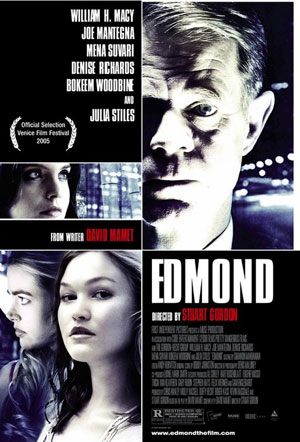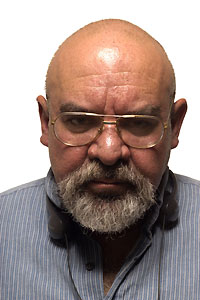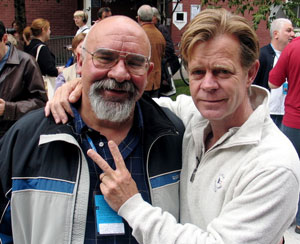 Technically the new film from Stuart Gordon isn’t a horror movie, but it’s scarier than half the genre films released in the last few years. It’s Edmond, based on the David Mamet play of the same name, a notoriously difficult and confrontational work that examines some of the darkest impulses hiding in all of us. William H Macy is the title character who finds his secret racism and hate and violence suddenly comes pouring out of him in one long, destructive night. It’s like Falling Down, except smart. And well made.
Technically the new film from Stuart Gordon isn’t a horror movie, but it’s scarier than half the genre films released in the last few years. It’s Edmond, based on the David Mamet play of the same name, a notoriously difficult and confrontational work that examines some of the darkest impulses hiding in all of us. William H Macy is the title character who finds his secret racism and hate and violence suddenly comes pouring out of him in one long, destructive night. It’s like Falling Down, except smart. And well made.
I first got to know the name Stuart Gordon from the original Re-Animator. I would walk to and from school every day past a video store that had the poster in the window, the one with the head in a pan and Herbert West holding a glowing green syringe. I had to see the movie, and eventually I did. I was 12 years old (I told Gordon this and his response was, ‘Someone let you watch Re-Animator when you were 12?’) and there was no going back. Re-Animator is really representative of Gordon’s films in general: from the title or concept they may look campy or even bad, but when you actually watch them they’re really well made and much smarter than expected. I mean, look at Robot Jox and Space Truckers – both far, far better films than their names would ever indicate to you.
When I talked to Gordon he was in Vancouver filming his next Masters of Horror episode, based on Edgar Allan Poe’s The Black Cat (and starring Jeffrey Combs as Poe!), and gearing up for his next film, Stuck, based on a horrifying true story. The Masters of Horror production schedule is relentless, but he was kind enough to give me some time to talk, and I wanted to start things off on the right foot.
Let’s talk about the word nigger. Why does it still have so much power today?
Gordon: I think it’s even more powerful now because we have all this political correctness going on, so we have to watch ourselves even more carefully than we used to.
It’s funny – the Bush Administration likes to say that there’s no more racism in America anymore. But the reality is that racism is on the rise and there are more hate crimes than ever.
Edmond makes the argument that racism is alive in every one of us.
Gordon: Yeah, I think that’s true. I think we’re all racists, if we would be honest with ourselves.
It’s also interesting that Edmond only finds a weird exhilaration in life when he kills somebody.
Gordon: Actually the scene you’re talking about with the pimp, he doesn’t kill the pimp. He beats the crap out of this guy. But the idea is that he faces something he’s always been afraid of and he conquers it, and he feels triumphant as a result.
Mamet’s plays can be challenging to adapt because they can be so mannered. How did you overcome that? This is a much more naturalistic feeling film. Gordon: I think it has to do with the way it’s performed. I worked with David Mamet very early in his career, and he said something to once to an actress that I thought was very wonderful. The actress was having difficulty and was stumbling over his speech, and he said, ‘What is this about? Those are just the words. It can be about whatever you want it to be, as long as you say those words.’ A lot of times in Mamet it isn’t what they’re saying, it’s what’s going on behind the words.
Gordon: I think it has to do with the way it’s performed. I worked with David Mamet very early in his career, and he said something to once to an actress that I thought was very wonderful. The actress was having difficulty and was stumbling over his speech, and he said, ‘What is this about? Those are just the words. It can be about whatever you want it to be, as long as you say those words.’ A lot of times in Mamet it isn’t what they’re saying, it’s what’s going on behind the words.
What I did was to tell the actors not to be so careful. I think David’s got a reputation as someone who expects you to hit every single word and comma and so forth – which is true – but you can make it your own, and you can make it about whatever you want it to be. And I think that was very liberating for everybody.
As you said you’ve worked with Mamet from just about the beginning of your career. I know he wrote the screenplay for Edmond – what was his involvement beyond that? Was he around when you shot or did he step back?
Gordon: He actually came to the very first day of shooting, which was nice. I said, ‘David you’re welcome to come as often as you want and any time you like,’ and he said, ‘Stuart, that’s like inviting someone to your honeymoon.’
I showed him the first rough cut of the picture and he had notes. It was interesting – in his deal we were not allowed to cut one line of his dialogue without his permission because I think he was afraid the studio would take out all the stuff that makes Edmond so fascinating. But after seeing the rough cut he came back to me with all these notes like, ‘I don’t think we need this line, and I think we could get rid of this and that.’ Some of them I agreed with and some of them I said, ‘No no no, that’s a great line, we can’t get rid of that.’
Speaking of the studio, Edmond is a difficult, confrontational play, and this must have been hard to get off the ground in the first place.
Gordon: It was. I would tell people that I had a David Mamet script and William H. Macy and Julia Stiles and the studios would go, ‘Fantastic, we’ll read it over the weekend.’ And then I would never hear from them again! The power of that script scared the crap out of people.
What we ended up doing was a company called Muse, which is known for doing edgy material like American Psycho, really embraced the project and took it to several little companies. We ended up with a dozen production companies on the film putting up, what was to them a lot of money, but was in actuality small amounts that were able to create our budget, which was just over a million dollars.
I spoke to Julia Stiles this summer when she was promoting The Omen, and I asked her if she felt that she was part of the Mamet gang, and she said she wasn’t sure. As someone who is part of that gang, do you feel like she’s in?
Gordon: Oh yeah. I’m surprised that she didn’t say absolutely. She’s definitely one of the regulars now, and she’s terrific.
regulars now, and she’s terrific.
You’re up in Vancouver right now doing your next Masters of Horror. You’re doing a Poe story and you have Poe himself in the story of The Black Cat – how are you making that work?
Gordon: We combined Poe’s life with the story. There are a lot of similarities. The story is about a man who has a drinking problem, and he’s a very sweet man normally but when he drinks he’s a monster. In the story he takes it out on the cat and eventually his wife. I think Poe was sort of delving into his own psyche when he wrote this story, so what we did was take elements of his life and made it about Poe and his 14-year old bride Virginia. We used some of the elements of Poe’s biography, one of them being that in the midst of all of this his wife gets tuberculosis. There’s a very famous scene which took place where his wife, who had a very beautiful singing voice, was singing for company in their home and suddenly started choking and spitting up blood. That was the beginning of her disease really, and talk about horror… this is the real deal.
What’s the Masters of Horror experience like the second time around? I know budgets and schedules are tight; does having done it once make it easier?
Gordon: It’s easier in that I know that people. I’m using the same DP from the first season, a guy named Jon Joffin who I think is quite wonderful. He’s an interesting personality and when we first met there were a few clashes, but eventually we got used to each others’ methods and became friends, so it’s a pleasure to be working with him on this.
Would you come back for a Masters of Horror 3?
Gordon: I would. I’ve been hearing some very positive rumors about there being a third season, so I would love to do it.
For me it’s kind of like working on the old Twilight Zone, and they give you a tremendous amount of freedom. I’m very appreciative of that. It’s also great fun to be hanging with the other horror directors, people I have idolized and become friends with.
What is the social scene like? I know you guys shoot them one at a time.
Gordon: You’re always prepping when someone else is shooting, and there’s someone new coming in when you’re doing your post and mix. We’re constantly running into each other, which is great. And we still have those dinners, where we get together and shoot the breeze.
And your next picture is Stuck, the story of a woman who hits a homeless guy and leaves him embedded in her windshield?
Gordon: It is. The two projects are pretty much back to back, so when I’m done with Masters I’m heading off to do Stuck.
Who’s going to be in Stuck?
Gordon: I cannot really officially say, but we have two wonderful actors to star in it.
What kind of a movie is it going to be? The story is really horrifying and also really just fascinating from a psychological angle.
Gordon: The script came out like something Hitchcock might have done. It’s a really suspenseful piece. This girl has done a terrible thing but is not a terrible person, really, and is trying to hide this from the world. At the same time you have this guy who is caught in the windshield who is trying to get himself out, realizing eventually that she’s not going to help him. He has to save himself and get out of that garage if he’s going to survive.
 It sounds naturally gruesome.
It sounds naturally gruesome.
Gordon: It is gruesome. But I think it also has a lot of other colors. I think it also has a certain amount of humor as well. All of my movies end up being dark comedies.
Speaking of dark comedies, you also have House of Re-Animator coming up. Macy is really going to be in this?
Gordon: Yeah! He’s looking forward to it. When we were working on Edmond, he said, ‘Stuart, I really want to work on one of your horror films.’ I told him about House of Re-Animator, and how it struck me that he would be the ideal person to play the President of the United States. He loved that idea.
My biggest question about House of Re-Animator has to be this: there’s obviously a level of satire going on, but how do you satirize the Bush Administration?
Gordon: I know! They keep coming up with stuff that we have to keep incorporating into the script. The whole Dick Cheney shotgun thing has to work its way in there now.
But what I think is interesting is that no one has taken them on – you have Michael Moore and Team America, and that’s it so far. I think it’s so wonderful that Joe Dante did his Masters of Horror episode as an attack on the Bush Administration and the war in Iraq. That’s one of the wonderful things about horror movies: they can deal with issues no one else wants to touch.
How does Herbert West end up in the White House?
Gordon: The story begins with Dick Cheney at a Halliburton victory party where he goes overboard with a lap dancer and has a massive heart attack. Since he’s the guy who is really running the country, they have to bring him back. The CIA knows about Herbert West and his exploits and is able to track him down and get Dick up and running again.
Not to get too nerdy on you, but is this going to be a direct sequel to Re-Animator, or will it take into account the other sequels?
Gordon: I think it’s going to make reference to the other movies. It’s hard not to. We are going to be bringing back Bruce Abbott, and he’s going to be the hero of it again. He was really the heart and soul of the first one, as far as I’m concerned.
You see a lot of movies now that come out as rated R and they have unrated DVD releases, but the extra stuff can’t even hold a candle to what you did in Re-Animator. Are you going to try to match that level of gore in House?
Gordon: Yeah. I think the idea is to really push it as far as we can. There will be some pretty outrageous moments in that. I can guarantee that.